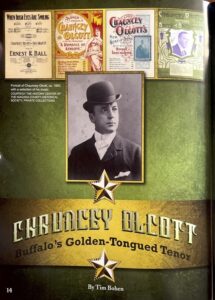Chauncey Olcott was born a few years prior to the start of the Civil War to an Irish immigrant mother. He was raised in Buffalo’s rough-and-tumble Canal District, where his mother, Peggy (Doyle) Olcott, ran a saloon to make ends meet. Opportunities for young Chauncey were limited to waterfront work like the other Irish descendants. But the talented Olcott, with a melodious voice, was determined to become and a famous singer and actor.
After a slow start, Olcott won the hearts of Irish and non-Irish Americans, performing to sold-out crowds across the country. He wrote, co-wrote, and debuted some of the classic Irish-American hit songs of the nineteenth century, including “When Irish Eyes are Smiling,” “My Wild Irish Rose,” and “Mother Machree.” Olcott went on to become one of the most famous performers of his day. His songs were number one hits, staying in the top ten for years and selling millions of copies of his song, sold as sheet music in the days before recordings.
Olcott produced plays and performed songs that elevated Irish status among the Protestant establishment. He replaced the Irish stage characters and blazed a path for Irish performers away from the lowly, despicable blackface roles to which the Irish had been relegated.
During his live performances, many of his songs brought the Irish diaspora to tears and helped them heal from their trauma that forced them from their homeland. During the period of the Great Famine in Ireland the population dropped from eight to four million due to starvation and emigration. His songs and plays helped alleviate the suffering of the Irish in terms of their marginalization and displacement from their homeland.
Walter Delaney in the Cincinnati Enquirer in 1969, 37 years after Olcott’s death, claimed the Irish singer was “unquestionably one of the most popular musical figures of all times.”
Olcott abstained from alcohol, dressed sharply, and acquired a world-class library of books and early American antique furniture. In the plays he acted in, Olcott often performed as an Irish hero who outwitted an Englishman who was trying to swindle him or steal his Irish colleen.
The Irish-American singer realized he could use his celebrity to elevate the image of the Irish with his fellow Americans, who often dismissed them as ignorant, clannish, and superstitious. In a 1909 interview, Olcott said that his life’s mission in the arts included “trying to help the world along with the genius of Ireland.”
As the son of an impoverished Irish immigrant, Olcott’s experiences of marginalization and discrimination hold lessons for today’s immigrants. In particular, his use of the arts (song and theater) was effective in uplifting the downtrodden immigrants from the Emerald Isle and acting as a bridge to connect their experience with the general public. While the current wave of immigrants and refugees come from different backgrounds and experiences than those from the nineteenth century, the arts and culture can be used to heal collective and individual and connect them more closely to those in their adopted community.
The post A nod to Buffalo-born tenor Chauncey Olcott, who co-wrote “When Irish Eyes are Smiling” appeared first on Buffalo Rising.

